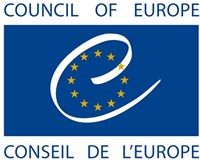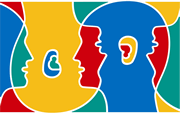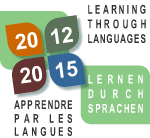ECML programme 2012-2015:
|
| NEXT THEME |
Cooperation
Agreement between the ECML and the European Commission
In May 2013 the European Centre for Modern Languages (ECML)
of the Council of Europe and the European Commission Directorate-General
for Education and Culture signed a contribution agreement
on 'Innovative methodologies and assessment in language learning'.
This joint management agreement covers a period of 12 months.
The action will include two initiatives:
- ICT tools for language teaching and learning: This
will aim at identifying the most efficient and accessible
ICT tools available in support of language teaching and learning;
- Linking language exams to the CEFR levels: The
second initiative will focus on the ways and means of incorporating
the levels of competence of the Common European Framework
of Reference for Languages (CEFR) in the examinations taken
at national level and will help educational authorities to
relate language examinations to the levels of proficiency
defined in the CEFR.
Partnership with Moscow State Linguistic University
In April 2013 the European Centre for Modern Languages (ECML)
of the Council of Europe and the Moscow State Linguistic University
signed a partnership agreement which represents the first
of its kind for the ECML and a formal way of increasing expert
contacts between the ECML and MSLU. The cooperation will focus
in particular on two ECML projects:
- Signed
languages for professional purposes (PRO-Sign): The
project will establish European standards for signed language
proficiency for professional purposes, focusing specifically
on sign language teaching in Deaf Studies and Sign Language
Interpreting programmes.
- Developing
migrants' language competences at work (Language for Work):
This project will create a European network for professional
development of teachers of migrant workers learning the majority
language. It will produce a web-based resource centre for
languages in the workplace, which comprises a toolkit of practical
resources for planning language training provision, with examples
of good practice and quality criteria and samples of teaching
materials.
The INGO Professional Network Forum on language education – Key issues in language education today
Report of the 4th annual meeting (Graz on 7 February 2013):
English
only
Updated flyer: English
- French
Web
pages relating to the Professional Network Forum
| NEXT THEME |
Social media

The ECML now has its own Facebook
page and Twitter
feed!
Join us on our Facebook and Twitter pages, where you will
not only find news and updates on our ECML activities, projects
and publications, but also news from the Centre's partners
and other leading organisations in the field of language education,
as well as a selection of articles in different languages
about language education. So please 'Like' and 'Follow us'
by clicking the links above and feel free to leave comments
and share!
| NEXT THEME |
Resources
Latest ECML publications
2012 Annual Report of the ECML:
Executive/PR
version
Bernaus, Mercèdes et al., Plurilinguisme
et pluriculturalisme dans l'enseignement d'une matière
– Kit de formation, 2012
Also available in English
Candelier, Michel et al., CARAP – FREPA –
A
framework of reference for pluralistic approaches to languages
and cultures, 2012
Also available in French
and Italian
Cortier, Claude, Cavalli, Marisa et al., Langues régionales/minoritaires dans l'éducation bi-/plurilingue – Langues d'ici, langues d'ailleurs, 2012 (French only)
Fischer, Johann et al., Evaluer
par les tâches les langues à fins spécifiques
à l'université: un guide, 2012
Also available in English
Full list of publications edited by the ECML, partner organisations and other leading organisations
Latest web developments
Articles and publications on the ECML: new web section.
| NEXT THEME |
Council of Europe developments related to languages

Recommandation
Council of Europe Recommendation on ensuring quality education (12 December 2012)
European Charter for Regional or Minority Languages
Council of Europe publishes report on regional or minority languages in the Slovak Republic
The Council of Europe Committee of Ministers has made public the third evaluation report on the application of the European Charter for Regional or Minority Languages in the Slovak Republic. It entered into force in the Slovak Republic in 2002. The report has been drawn up by a committee of independent experts, which monitors the application of the Charter. On the basis of this report, the Council of Europe calls on the Slovak Republic to review the legislation so that minority languages are used in administration even if the persons belonging to a national minority represent less than 20% of the population. The Slovak authorities are also called upon to develop further minority language education and to improve the training of teachers for this field. Furthermore, Romani should be taught on a large scale and measures be pursued to abolish the unjustified enrolments of Roma children in separate schools or classes. The Slovak authorities are further requested to take steps so that more public radio and television programmes are broadcast in the minority languages. The Council of Europe also calls on the Slovak authorities to promote in the Slovak society awareness and tolerance in regard of all minority languages in the country.
Council of Europe publishes report on regional or minority languages in the Czech Republic
The Council of Europe Committee of Ministers has made public the second evaluation report on the application of the European Charter for Regional or Minority Languages in the Czech Republic. It entered into force in the Czech Republic in 2007. The report has been drawn up by a committee of independent experts, which monitors the application of the Charter. On the basis of this report, the Council of Europe calls on the Czech Republic to adopt a strategy for the protection and promotion of German, to encourage its use in public life and to provide teaching in or of this language. The same measures are recommended for Romani. The Czech authorities are further requested to improve the legal framework relevant for minority language education and for the display of bilingual place-name signs. The Council of Europe also calls on the Czech authorities to pursue their efforts to promote awareness and tolerance in regard of all minority languages in the country, as well as to ensure that the Romani-speaking children are not prohibited or discouraged to speak their language at school.
| NEXT THEME |
European Wergeland Centre (EWC): Share & Connect
The European Wergeland Centre (EWC) is a resource centre for teachers, teacher trainers, researchers, policy makers and others in the field of education for democratic citizenship, human rights and intercultural understanding. EWC is a privileged partner of the Council of Europe with a mission to build bridges between policy, research and practice.
The EWC offers several free online services and resources. EWC is proud to offer the new online platform Share & Connect, an online community of practice for educators and others promoting education for democratic citizenship, human rights and intercultural understanding. Share & Connect provides networking facilities and opportunities for individuals and organizations to cooperate on projects and share resources, events, news, calls and more - all in one place and free for all.
A growing number of organisations working in the field of democratic citizenship, human rights and intercultural understanding use Share & Connect along with more than 900 members.
Visit Share & Connect to take part!
| TOP OF PAGE |
Quick links
All
issues of the European Language Gazette
European Centre
for Modern Languages (ECML)
Calendar
of activities 2013
ECML
online publications
Language
Policy Unit
Pestalozzi Programme
European
Charter for Regional or Minority Languages
Council of Europe
Experts Database
International
Events Calendar




